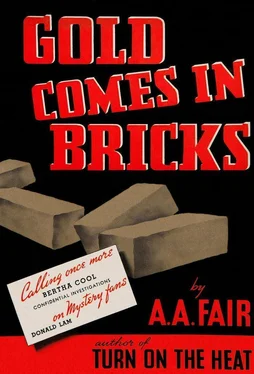“Simply telling you the truth,” I said.
“Well, you and I are going to talk things over. Come on. Let’s get out of here.”
Bertha Cool said with dignity, “In the future, Mr. Ashbury, you’ll get reports from me. Donald is going to submit regular typewritten reports. I’ll get the information and pass it on to you. This agency has been getting too damned irregular.”
Ashbury turned to her and said, “What are you talking about?”
“Your arrangements are with me. In the future kindly make all arrangements through me. I’ll give you the information.”
He looked at her over the tops of his glasses. His voice was low, well modulated, and exceedingly polite. “I take it,” he said, “that I’ve been getting a little out of hand.”
“Donald has.”
“About the expense money perhaps?”
“That’s part of it.”
Ashbury said, “Come with me, Donald. You and I are going to have a talk.”
Bertha Cool said acidly, “Don’t mind me. I’m just his employer.”
Ashbury looked at her. He said quietly, “My principal concern is for myself, and I happen to be the one who’s paying all the bills.”
That had Bertha falling all over herself. She said, “Why certainly, Mr. Ashbury. We’re representing your interests. The thing we want the most is to do what you want.”
Ashbury took my arm. “All right,” he said. “Come on.”
“Where are we going?”
“Downstairs in my car.”
“It might be a good plan to travel,” Bertha Cool said to me.
“I’ve thought of that. Where’s the agency car?”
“In the garage.”
“See you later,” I said.
“When can I have Elsie back?”
“I don’t know.”
Bertha Cool struggled with her temper, and Ashbury took my arm, led me across the office, and down to a parking station where he’d left his big sedan. “All right,” he said, “we talk here.”
He slid in behind the steering wheel. I sat beside him. “What’s all this about Bob?”
I said, “Use your head.”
“I am. I should have done it a long time ago, but that possibility never occurred to me.”
“What other reason could there have been?”
“I thought it was a frame-up to get my money into the business. I thought Bernard Carter was the real brains behind the thing and was making all the money. I thought Mrs. Ashbury wanted to get him in on some easy pickings, and they decided the best approach would be through Bob.”
I said, “Well, it’s a racket. They’re pushing Bob out in front. I don’t think Bernard Carter has much to do with it.”
“Well, he’s mixed up in it.”
“A shrewder mind than Carter’s is back of it, and if Carter’s in it, he’s probably being played for a sucker. From all I can gather, Carter wouldn’t exactly want to have Mrs. Ashbury’s son get into trouble on his account.”
Ashbury gave a low whistle. “What’s the racket?” he asked.
I said, “They bought up some valueless tailings up by Valleydale, and are spreading a line of hooey that they’re rich in gold.”
“Are they?”
“I don’t think so. The dredging company didn’t dredge much where they couldn’t get down to bedrock.”
“That’s the idea back of it?”
“That’s it.”
“What are they doing?”
“Selling stock of a par value of one dollar in a defunct corporation at the modest price of five hundred dollars a share.”
“Good God, how can they do that?”
“Shrewd salesmanship, high-pressure, once-over, glib-talking men who work the rush act and dangle a golden bait in front of a man’s eyes. They set themselves a limited time for their talk. They stick a watch in front of the sucker. The sucker is always so imbued with the idea of being a busy executive that when it comes time for him to ask questions, he taps his fingers on the dial of the watch and sternly reminds the salesman that he’s taken up his allotted share of time.”
“That’s the way they work the rush act?”
“Yes. The customer really rushes himself.”
“It’s a swell idea,” Ashbury said. “Damned good psychology, when you stop to figure it.”
“It seems to be working.”
“So the prospect doesn’t ask any questions?”
“No. Every time he does, the salesman starts in talking as though he was finishing up the sales argument which the prospect interrupted because he’d run over his appointed time. That makes the prospect mad, and he shuts him off.”
“By gosh,” Ashbury said, “if Bob thought of that, he’s a lot cleverer than I gave him credit for.”
“He didn’t.”
“Who did?”
“I don’t know... probably an attorney by the name of Crumweather, who also worked out a scheme for beating the Blue Sky Act.”
“Is the scheme legal?”
“Probably not, the way they’re working it. That’s why Bob’s president.”
“There’s nothing wrong with that method of salesmanship?”
“No. It’s damn clever.”
Ashbury drew a handkerchief across his forehead. “And to think that I was so damn dumb — so eager to keep out of the boob’s business confidences — I didn’t see what was happening.”
I didn’t say anything.
After a while he said, “What are you planning to do, Lam?”
“How badly do you want to keep Bob out of jail?”
“No matter what happens,” he said, “we can’t have anything like that.”
“I thought I’d run up to Valleydale for a day or two.”
“Why?”
“That’s where they’re operating.”
“What do you expect to find up there?”
“I might find the records of the old dredging company dealing with a survey of the land they dredged.”
“Then what?”
“If I could get them,” I said, “and they show what I think they’ll show, I’ll make a deal with the lawyer — but I don’t think I can get them.”
“Why not?”
“The brain that thought up that sales canvass and beating the Blue Sky Act has probably taken care of all that.”
“What else will you do?”
“Look the ground over and try and find the crooked part of the scheme.”
“And while you’re gone, how about — er — this other matter?”
“This other matter,” I said, “is getting hot, too hot for me to handle right now without getting my fingers burnt. I thought I’d stay away for a day or so and let it cool off.”
“I’m not certain I like that. Alta telephoned a little while after you’d left. She said that she thought you were coming back, that you’d just gone to the garage with me. She wants to see you. She’s worried — she’s — dammit, Donald, we’re all coming to depend on you.”
“That’s what I’m hired for.”
“I know, but this is different. Alta would be lost if you left.”
“Alta has to leave, too.”
“What?”
“You heard me.”
“You mean go with you?”
“No. Go some place. Visit someone. Spend a few days with some out-of-town friend — and don’t let anyone know where she’s going.”
“Why?”
“Because I don’t want anyone asking her questions until I know a few more answers.”
“Then why are you going away?”
I said, “Detectives are on my trail right now. They’re checking up — do you want me to tell you what they’re after?”
“No.”
“All right, then. I’ll tell you what I’m going to do, and what you can do.”
He thought for a minute, took a cigar from his pocket, clipped the end off, and struck a match. “When are you going?” he asked.
“Now.”
“Where can I get in touch with you?”
“It’s better that you don’t. If anything comes up, get in touch with Bertha Cool.”
Читать дальше












